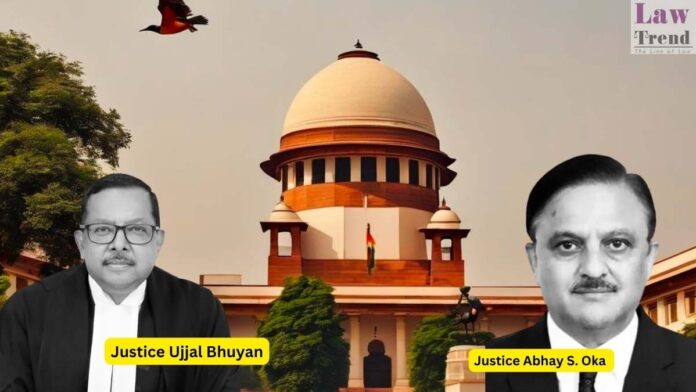In a significant move aimed at expediting the criminal justice system, the Supreme Court of India has directed all High Courts to submit comprehensive data on pending criminal appeals, specifically highlighting cases where accused individuals remain incarcerated without bail. The court issued this directive while hearing SMW (Crl.) No. 4/2021 – In Re Policy Strategy For Grant Of Bail.
Background of the Case
The suo motu writ petition was initiated by the Supreme Court to address systemic delays in the disposal of bail applications and criminal appeals. The National Legal Services Authority (NALSA) and various state governments have been involved in this matter, emphasizing the necessity of ensuring timely justice for undertrials languishing in prisons. The case also incorporates Special Leave Petition (SLP) (Crl.) No. 529/2021.
The case was presided over by Justice Abhay S. Oka and Justice Ujjal Bhuyan. Senior Advocate Ms. Liz Mathew and Advocate Mr. Devansh A. Mohta appeared as Amicus Curiae, assisting the court in identifying challenges and proposing policy recommendations.
Multiple legal representatives, including Mr. Gaurav Agrawal (Advocate for NALSA), Mr. Abhimanyu Tewari (State of Arunachal Pradesh), Mr. Yogesh Kanna (State of Tamil Nadu), Mr. Chanchal K. Ganguli (State of West Bengal), Mr. Samir Ali Khan (State of Bihar), and Mr. Milind Kumar (State of Rajasthan), among others, represented their respective states in the matter.
Key Directives of the Supreme Court
In a strong push for judicial accountability, the Supreme Court directed the Registrar Generals of all High Courts to provide a detailed report on the backlog of criminal appeals, categorized as follows:
Total number of pending appeals against convictions before Single Judges and Division Benches.
Further classification of pending conviction appeals into:
Cases where accused individuals have been granted bail.
Cases where accused individuals remain incarcerated.
Number of pending appeals against acquittals before Single Judges and Division Benches.
The Supreme Court ordered the Registrar (Judicial) of the apex court to ensure that this directive reaches all High Courts immediately. The courts have been given one month to submit the required data, following which the matter will be reviewed on March 24, 2025.
Court’s Observations
The Supreme Court emphasized the importance of efficiency in the judicial process, stating:
“Justice delayed is justice denied, and no accused should suffer incarceration merely due to procedural inefficiencies.”
This observation underscores the need for a structured policy to address the growing pendency of criminal cases. The directive aligns with the court’s recent stance on expediting legal proceedings, particularly in cases where individuals are deprived of their liberty.




